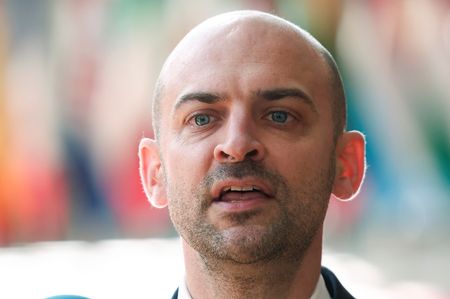By Anant Chandak and Shaloo Shrivastava
BENGALURU (Reuters) -Britain’s economy will grow at a slow, steady pace this year and next, keeping the Bank of England on course to cut interest rates on August 7 and again in November despite inflation remaining above target in coming months, according to most economists polled by Reuters.
After starting the year on a strong footing, the economy lost steam with GDP shrinking in April and May, partly driven by weak factory activity. Manufacturing contracted for a tenth consecutive month in July, a separate survey showed on Thursday.
Britain was the first major economy to secure a trade deal with the United States under President Donald Trump, partly shielding its economy. Many others, including the European Union, are still scrambling to land agreements with Washington ahead of a deadline next week.
The British economy will grow 1.1% on average this year, the same as in 2024, according to median forecasts in the July 17-24 poll of 67 economists, a view largely unchanged since February. The economy is seen expanding 1.2% next year.
“We are seeing some tangible signs the economy is stabilising after a bit of a pull down or a pull back in growth momentum,” said Sanjay Raja, chief UK economist at Deutsche Bank.
“There has been resilience. We have seen a pick-up in business sentiment…we’ve seen consumer sentiment pick up slowly but surely. Credit conditions remain pretty optimistic.”
Consumer sentiment has reflected the tug-of-war between persistent inflation and easing borrowing costs.
Inflation rose to 3.6% in June, driven by food and transport costs, but falling mortgage rates and expectations of further interest rate cuts later this year are offering some relief to households.
“We’re expecting inflation to get closer to 4% in Q3. But thereafter we think those price pressures will start to wane…trade dumping from Asia into the UK and Europe could act as a disinflationary driver going forward,” said Raja.
The Bank of England has already cut rates four times since August 2024, bringing the Bank Rate down a full point from a peak of 5.25%.
An 83% majority of economists, 62 of 75, expect two more 25-basis-point cuts this year – in August and November – maintaining the pace of one cut per quarter. That would put the Bank Rate at 3.75% at year-end, and two further reductions are expected in 2026.
“We agree with the slow and steady approach. If wage growth starts to come down that will give (the BoE) hope for overall inflation to come down,” said Elizabeth Martins, senior UK economist at HSBC.
“Unfortunately, the risk is towards inflation staying higher and that’s the way all the surprises have gone in recent times.”
Inflation is expected to remain above the central bank’s 2.0% target at least until the end of next year, averaging 3.2% this year and 2.4% in 2026, according to the poll’s median forecasts.
(Other stories from the Reuters global economic poll)
(Reporting by Anant Chandak and Shaloo Shrivastava; Polling by Reshma Ann Samuel and Mumal Rathore; Editing by Kirsten Donovan)









